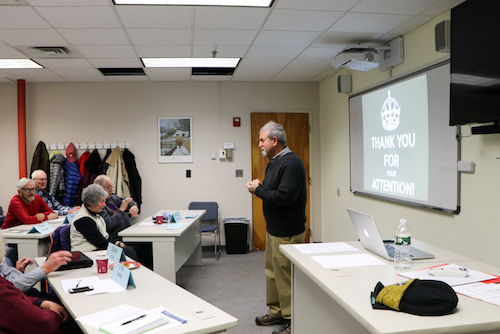Senior college provides opportunity for continued learning
January 31, 2020
Addressing the room in the final session of his “U.S. National Security Structure and Processes” class, Dan Possumato quipped, “My therapist tells me that with a lot of work, I may recover [from teaching this class].” The room broke out in laughter.
Possumato’s class, which is composed of senior students, is one of the many courses offered at Midcoast Senior College located at Brunswick Landing and balances lively debate with thoughtful questions.
Founded in 2000, the Midcoast Senior College offers local residents over the age of 50 a chance to pursue continued adult education and life-long learning. One of 17 senior colleges in Maine, the school offers courses during all seasons on a wide array of topics, ranging from Shakespeare to Information Technology
 Emma Sorkin
Emma Sorkin“In a lot of these classes, the students bring as much to the class as the instructor imparts to the class,” said Doug Bates ’66, the current President of the Senior College. “In other words, we usually want to caution instructors in a class: just because they are knowledgeable about whatever the subject is, [that] doesn’t mean there [won’t] be three or four other students in the class who might be equally knowledgeable on [their] subject.”
Students at the school have a distinctive relationship with their professors, unlike the one between Bowdoin students and their professors.
“Our students are not inhibited about crossing swords with the professor,” said Tony Belmont ’60, former president of the Senior College. “If you’re a Bowdoin student and you disagree too vigorously with a professor, he says, ‘You flunk!’”
In order to enroll in a course, students must become members of the organization. There are between 700 and 750 members in this area, according to Bates.
“Most of our students are over 65 because our classes are given during the daylight hours [and] working people just can’t do it,” Belmont said.
The college relies on local residents to serve as faculty members as well.
“This community … attracts a number of retired academics from all over the country who choose to come here in their retirement years. We have the luxury of having a faculty that’s made up of a pool of these retired academics,” Belmont said.
According to Bates, the professors at the Senior College shape a classroom atmosphere that suits older students.
“Many of the instructors are retired college professors, or they are people who had a certain expertise about some subject,” Bates said. “So they bring with them not only the [central] information but the experience of working with whatever that subject information is. So the result is you get people with real life experiences in the classroom as opposed to theoretical experiences, and this is what most of these people seek.”
Possumato, for example, is a former director of Plans, Training, Mobilization and Security for the U.S. Army and a professor at the Army Management Staff College. He is currently a special investigator for the U.S. Department of State.
“The neat thing … [is that] there are a lot of people in the area who have incredible skills … and a lot of experiences and they put courses together and teach them, and it’s very, very interesting,” Roy Hibyan ’67, a student in Possumato’s course said.
The Senior College is just one opportunity for citizens to pursue adult education. Auditing classes at Bowdoin is an option but presents challenges for the Senior College’s students.
“You can’t park within 10 miles of the classrooms, and if our old people come in with their walkers … that’s a real problem, and some of the buildings don’t have elevators,” Belmont said. “But nevertheless, it’s a wonderful service that Bowdoin offers.”
Auditing a class at Bowdoin often involves completing readings and writing papers, Bates said. The Senior College courses present a less demanding alternative.
“This is an opportunity to take any class that [students] want on subjects that they were curious about but didn’t have time to explore because we offer these classes with no papers and no exams,” Bates said. “There’s very little risk to the student. It’s both a social experience and an academic experience.”
Ginny Hopcroft, a student at the Senior College, worked as a research librarian and managed the government publications collection at Bowdoin for 20 years. Hopcroft began taking classes at the senior college after retiring from Bowdoin in 2012, and for her, taking courses fulfills her desire to continue learning.
“[I take classes] just to keep my mind fresh and learning new things,” Hopcroft said. “It’s always good to learn, and the teachers here are wonderful.”

Comments
Before submitting a comment, please review our comment policy. Some key points from the policy: